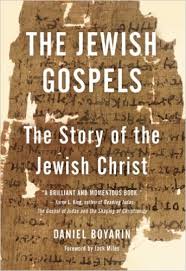Thanks John.
The Old Testament issue about its Christian prophecies is interesting. I think that the Old Testament did have a prophecy of a Messiah who would get killed, but the image is not laid out in the same clarity, that, say, many historic stories in the Old Testament are. The story of Moses for example is narrated in a matter of fact straightforward way, with all its mythical supernatural events. With the Messianic prophecies on the other hand, it's interesting - there are not even any direct indisputable fully clear narrations of the Messiah in prophecy in the Old Testament.
The concept of the Messiah son of David is well known in Jewish tradition from the 1st c. AD. But if you go back into the Old Testament, there is no place where the concept is fully clear. Even the most foundational, the prophecy of Nathan to David about his future "son" having an everlasting dominion, could be seen by some people to just be hyperbole talking about his son Solomon.
It's natural then that any prophecies about this Messiah's death are going to end up being cloudy and debatable poetry too, just like their subject is.
So some story about the Messiah getting his hands gouged in Psalm 22 is the kind of thing people can rationally debate about too - like "What does it mean to get one's hands gouged and is this just hyperbole and allegory?"
My own opinion is that the Tanakh at times did talk about the Messiah as a future redeemer, but it did it in this kind of cloudy allegorical way that we associate with prophecy. In a way I think that the style of writing prophecies in the OT is a bit like the kind of oracles that were happening elsewhere in the ancient world, or even the kind of style we associate with Nostradamus. The Oracles might make some cloudy dreamlike prediction with various "signs". We see that too in the predictions made by Joseph about Pharaoh or Daniel about King Nebudchadnezzar. Adherents of Judaism and Christianity would argue back that pagan style "oracles" and divinizations were banned by the Torah. And that's true, but it seems to me that there was a similarity in the way they expressed their predictions using various "signs" and "symbols".
And I think that the Christian community did interpret these "signs" correctly, in seeing them as pointing to the concept of a Messianic redeemer who would get killed and resurrect. The "signs" exist throughout the Old Testament. One of the most foundational aspects of the Torah was the sacrifices, especially at Passover and the Day of Atonement, where the lamb or ram played a climactic role in bearing the people's sins or having its blood serve as a protective sign for the nation. The concept is well laid out in Paul's Epistle to the Hebrews. And the concept of the Messiah as redeemer who through his sacrifice bears the people's sins and redeems them fits into this model.
I'm also well aware of rabbinical objections to this understanding of the Messiah. For example, the Old Testament bans Israelites from performing human sacrifice and when Moses asked to serve as an atonement, his request was refused. There are also counterarguments to those objections. Moses was refused as he was not sinless and indeed he never lived in the promised land, because of his faithlessness in God's directly spoken instructions. The rabbinical objections I think do not really address the fact that nevertheless the mentality of the Torah saw redemption and atonement in terms of sacrifice.
As the Orthodox Talmudic scholar Daniel Boyarin has suggested, I think that in ancient times there really was a mainstream view in the Jewish community about a suffering Messiah - although it may not have been the only view about the Messiah. And I think that what happened was that once Christianity spread, it created a dialectical philosophical dispute that institutional Judaism began to react against. And so in reaction against Christian claims about the Messiah's sacrifice, this once common view became strongly downplayed and sidelined to the point where talk of a suffering Messiah was either seen as "Christian" and heretical, or else talked about only in passing.


Suffering Messiah is a Very Jewish Idea
Daniel Boyarin is a Jewish scholar of some repute. ... In The Jewish Gospels: The Story of the Jewish Christ Boyarin argues that the Christian belief in a suffering messiah who atones for our sins was far from some bizarre offence to Jews but in fact was itself an established pre-Christian Jewish interpretation of the books of Isaiah and Daniel.
The idea of the Suffering Messiah has been “part and parcel of Jewish tradition from antiquity to modernity,” writes Boyarin, and therefore the common understanding that such a belief marked a distinct break between Christianity and Judaism is quite mistaken.
Other traditions appear in the Babylonian Talmud from a later period (300 to 600 CE) “but very likely earlier” (p. 153). One of these is from Sanhedrin 98. The question is there asked “What is the Messiah’s name?” Different rabbis offer various answers.
After several views, we find: “And the Rabbis say, ‘the leper’ of the House of Rabbi is his name, for it says, ‘Behold he has borne our disease [the word here means ‘leprosy’], and suffered our pains, and we thought him smitten, beaten by God and tortured’ [Isa. 53:4].”
So here we find Jews interpreting Isaiah 53 as a prophecy of the vicarious sufferings of the Messiah.
Boyarin then mentions that on the previous page in the Talmud is a scene of the Messiah sitting among the diseased and poor at the gates of Rome, and understanding that he has a saving role to perform for these wretched sufferers by identifying with them.
http://vridar.org/2015/08/26/suffering- ... wish-idea/
The article has more information about D.Boyarin.
I remember reading one ancient pagan writer noting that the Jewish community in the 1st c. was earnestly awaiting a Messiah at that point based on an ancient prophecy that he would come at that time. This might have been the prophecy in Daniel 9 that according to Rabbi Maimonides calculated the End Times to occur in the 1st c. AD.
So sure, I understand what you are saying, John, about how after Jesus' death the apostles were looking at images in the Old Testament like the experiences described in Psalm 22, and then linking them to Jesus' own past experiences.
I think you are right about that. That is, from their point in time, 33-63 AD, they were looking backwards into the past at Jesus' experiences and matching up images from the Old Testament with his biography, like the crucifixion.
My own main question about the Old Testament prophecies works in the opposite direction, forwards.
Supposing that the Old Testament did make these prophecies, does it mean that they would actually occur? If we or the apostles were at a standpoint in time not in 33 AD - 2016 AD, but were back in 20 AD or earlier, should we have concluded that the Messiah would probably get killed in the 1st c. AD?
One initial question is whether Psalm 22 is Messianic. The rabbis had a custom of relating the Psalms not just to David, but to the Messiah. After describing how the narrator got killed and then saved, Psalm 22 says:
All the ends of the world
Shall remember and turn to the Lord,
And all the families of the nations
Shall worship before You.
...
A posterity shall serve Him.
It will be recounted of the Lord to the next generation,
In other words, the saving action described in the Psalm would become a monumental action recounted by the whole world for generations. For the whole world to worship God and recount a story gives the Psalm a crucial Messianic aspect, since bringing the nations of the world to God is a key task of the Messiah.
And so, supposing that Psalm 22 really is about the Messiah and about his limbs getting gouged and him dying and resurrecting, does this mean that the predicted events would actually occur?




